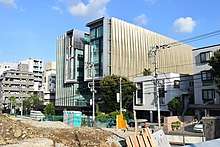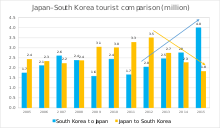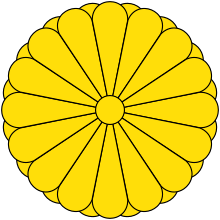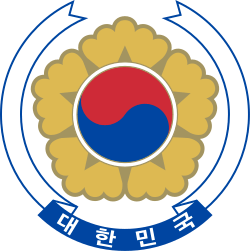Japan–South Korea relations
|
| |
Japan |
South Korea |
|---|---|
| Diplomatic Mission | |
| Japan Embassy, Seoul | Korea Embassy, Tokyo |
| Envoy | |
| Ambassador Kōrō Bessho | Ambassador Yu Heung-su |
After the division of Korea, Japan and the Republic of Korea (ROK) had established diplomatic relations in December 1965, under the Treaty on Basic Relations between Japan and the Republic of Korea, with Japan recognizing South Korea as the only legitimate government of the whole Korean peninsula.
Japan and South Korea are close neighbors, as they are both main allies of the United States in the Northeast Asia. In recent years, however, the relationship has greatly deteriorated due to many disputes, including the territorial claims on Liancourt Rocks (Dokdo or Takeshima), Japanese prime ministers' visits to Yasukuni Shrine, and differing views on Imperial Japan's treatment of colonial Korea, as well as Japan's refusal to negotiate Korea's demands that it apologize or pay reparations for mistreatment of World War II comfort women from Korea. The Diplomatic Blue Book by the Ministry of Foreign Affairs of Japan in 2018 removed the phrase present in the previous year referring to the ROK as 'Japan’s most important neighbor that shares strategic interests with Japan.'[1] These tensions have complicated American efforts to promote a common front against Chinese threats in the region.[2]
According to a 2014 BBC World Service Poll, 13% of Japanese view South Korea's influence positively, with 37% expressing a negative view, while 15% of South Koreans view Japanese influence positively, with 79% expressing negatively, making South Korea, after China, the country with the second most negative perception of Japan in the world.[3]
History

See History of Japan–Korea relations for the pre-1945 history.
In line with the 1965 reconciliation treaties, Japan continued to improve its relations with South Korea. Tokyo extended an additional $200 million credit to Seoul, and Prime Minister Sato attended official functions in July, the first visit of a Japanese premier to postwar Korea. Nevertheless, Seoul objected violently to occasional visits by Japanese politicians to North Korea, to the continuation of Red Cross repatriation of Korean residents in Japan to North Korea, and to the proposal of Tokyo Governor Minobe to permit a pro-North Korean university in Tokyo. The Japanese Foreign Ministry opposed Minobe on this issue in order to prove its loyalty to South Korea. Meanwhile, contacts between Japan and South Korea increased through new air routes, tourism, and trade.
In 1975, South Korean–Japanese relations improved following the July "settlement" of a two-year-old feud that began when South Korean agents abducted Kim Dae-jung, an opposition leader (and future President of South Korea), from a Tokyo hotel. As a result of the settlement, a long-delayed ministerial conference was held in Seoul in September to discuss economic cooperation between the two countries. Japan joined the United States in providing assurances for South Korea's security. In a joint statement by Japanese Prime Minister Takeo Miki and President Ford declared: "The security of the Republic of Korea is ... necessary for peace and security in East Asia, including Japan"
Trade and partnership
In 1996 FIFA announced that the two countries would jointly host the 2002 FIFA World Cup. The next few years would see leaders of both countries meet to warm relations in preparations for the games.[4] Though citizens of both countries were initially unhappy about having to share the honors with the other, and the Liancourt Rocks controversy flared up again, the event turned out to be very successful.
According to David Kang and Jiun Bang, South Korea has tried to create a peaceful middle ground with other North Asian countries such as Japan, for business and trade because of it objective to be the "center of Asian business".[5] The two argue that this agreement favors China more than Japan due to South Korea's unsafe political security history with Japan, which has affected the Seoul-Tokyo economic relations.[5] This has led to a decrease in trade and export between both countries; Japanese tourism is one of the big exporting services South Korea offers, which decreased by a rate of approximately 23% between the year 2012 and 2013.[5]
In 2013 South Korea banned the import of fish from eight states in Japan due to growing concerns over the Fukushima nuclear power plant waste incident, after Tokyo Electric Power Company (TEPCO) declared the incident to be a radioactive waste a couple of years after the earthquake.[6] Japan considered the ban a hostile move, leading the Japanese government to file a complaint to the World Trade Organization (WTO) in May 2015, claiming that Seoul was "discriminating against" Japanese seafood'.[7] In October 2017 the WTO issued a ruling, with reports stating that South Korea lost the case.[8]
Disputes
The Sea of Japan naming dispute
There is dispute over the international name for this body of water. Japan points out that the name "Sea of Japan" (Japanese: 日本海) was used in a number of European maps from the late 18th century to the early 19th century, and that many maps today retain this naming. However, South Korean government has protested that the term "East Sea" has been used in Korea for 2000 years and Japan encouraged the usage of the name "Sea of Japan" while Korea lost effective control over its foreign policy under Japanese imperial expansion.[9] South Korea argues that the name "East Sea" or "Korean Eastern Sea" (Hangul: 동해; Hanja: 東海), which was one of the most common names found on old European maps of this sea, should be the name instead of (or at least used concurrently with) "Sea of Japan."
Japan claims that Western countries named it the "Sea of Japan" prior to 1860, before the growth of Japanese influence over Korean foreign policy after the outbreak of the First Sino-Japanese War in 1894. Further, Japan claims that the primary naming occurred during the period of Sakoku, when Japan had very little foreign contact, and thus Japan could not have influenced the naming decisions.[10] It was in 1928, when the International Hydrographic Organization's Limits of Oceans and Seas officially took the name Sea of Japan, which eventually influenced other official international documents such as the United Nations. Japan also claims that is isn't important whether the term "East Sea" has used in Korea for 2000 more than years because it is only the localized name and how it was named internationally is more important. South Korea claims that Korea was occupied by the Japanese and effectively had no international voice to protest in 1928. Also since the East sea was precisely noticed only by Korea and Japan, so how the western conqueror called named it as their own record isn't important.
Liancourt Rocks
The Liancourt Rocks, called Dokdo (독도, 獨島; "solitary island") in Korean and Takeshima (竹島; "bamboo island") in Japanese, are a group of islets in the Sea of Japan that is occupied by South Korea. There are valuable fishing grounds around the islets and potentially large reserves of methane clathrate.[11]
The territorial dispute is a major source of nationalist tensions between the two nations.[12] Currently, South Korea occupies the island, which has its Korean Coast Guard stationed there, as well as two elderly Korean residents.[13]
Comfort women for Japanese military
Korea has been demanding official acknowledgement with a sincere apology and compensation for the "sex slaves" or "comfort women" issue, referring to the women and girls who were forced to have sex with Imperial Japanese military soldiers during World War II. According to the World Conference on Japanese Military Sexual Slavery, enlisted to the military stations through force, kidnapping, coercion, and deception, the Korean sex slaves, mostly girls under the age of 18, were forced to have sexual relationships with 30–40 soldiers each day.[14] According to the New York Times, "Most mainstream historians agree that the Imperial Army treated women in conquered territories as spoils of battle, rounding them up to work in a system of military-run brothels known as comfort stations that stretched from China to the South Pacific. Many were deceived with offers of jobs in factories and hospitals and then forced to provide sex for imperial soldiers in the comfort stations. In Southeast Asia, there is evidence that Japanese soldiers simply kidnapped women to work in the brothels. Among the women who have come forward to say they were forced to have sex with soldiers are Chinese, Koreans and Filipinos, as well as Dutch women captured in Indonesia, then a Dutch colony."[15] Japanese media attempts to shift blame for the wartime brothels away from the Japanese military onto others, saying, "Prostitution agents were prevalent due to the poverty and patriarchal family system. For that reason, even if the military was not directly involved, it is said it was possible to gather many women through such methods as work-related scams and human trafficking."[16] As the few surviving female victims continue to strive for official acknowledgment and a sincere apology, the Japanese court system has rejected such claims due to the length of time and claiming that there is no evidence.
In November 1990, the Korean Council for the Women Drafted for Military (한국정신대문제대책협의회; 韓國挺身隊問題對策協議會) was established in South Korea. In 1993, the government of Japan officially acknowledged the presence of wartime brothels. As of 2008, a lump sum payment of 43 million Korean won and a monthly payment of 0.8 million won are given to the survivors.[14][17] The Japanese government has also arranged an organization that gives money and official letters of apology to the victims.[14] Today, many of the surviving female victims are in their 80s. As of 2007, according to South Korean government, there are 109 survivors in South Korea and 218 in North Korea. The survivors in South Korea protest in front of the Japanese embassy in Seoul, Korea every Wednesday. The protest was held for 1000th time in December, 2011.[18]
In December 2000, The Women’s International War Crimes Tribunal on Japan’s Military Sexual Slavery sat in Tokyo, Japan. During the proceedings, the judges of the Tribunal heard hours of testimony by 75 survivors, as well as reviewed affidavits and video interviews by countless others. The Tribunal's Judgment found Emperor Hirohito and other Japanese officials guilty of crimes against humanity and held that Japan bore state responsibility and should pay reparations to the victims.
In July 2007, the U.S. House of Representatives passed a non-binding resolution that Japan apologize for forcing women into sex slavery during World War II. The resolution was sponsored by Mike Honda (D-CA), a third-generation Japanese-American.[14][19] On December 13, 2007, the European Parliament adopted a resolution that demands the Japanese government to apologize to the survivors of Japan's military sexual slavery system. This resolution was passed with 54 ayes out of 57 parliament members present.[20]
On 28 December 2015, Japan and South Korea have agreed to settle the issue of "comfort women" forced to work in Japanese brothels during World War II, in their first such deal since 1965. Japan had made apology and will pay 1bn yen ($8.3m, £5.6m) to fund victims. The announcement came after Japan's foreign minister Fumio Kishida arrived in Seoul for discussions with his counterpart Yun Byung-se, following moves to speed up talks.
Cultural exchange
In spite of the many disputes that are negatively affecting the relations between the two nations, Japan and South Korea enjoy cultural exchanges with each other.
From South Korea to Japan
In recent years, South Korean pop culture experienced some popularity in Japan, a phenomenon dubbed the "Korean Wave" (韓流) among K-pop fans in Japan. The Korean Wave has sparked a fad for Korean movies, dramas, and pop music in Japan.
A Korean television series entitled Winter Sonata, which first appeared in Japan in April 2003, became a runaway hit in Japan,[21] and has often been identified as a landmark in South Korean-Japanese cultural exchange. The female K-pop artist BoA is one of the most popular singers in Japan with six consecutive albums topping the billboard charts.[22]
In more recent years various K-pop artists, including Super Junior, TVXQ, Choshinsung, Big Bang, Kara, Girls' Generation, and 2PM, have made their debuts in Japan, and these groups have contributed to the rebirth of the Korean Wave in Japan. Kara and Girls' Generation in particular has been topping numerous charts and awards in Japan.[23][24]
From Japan to South Korea
After the end of World War II, South Korea banned Japanese cultural imports such as music, film, video games, literature (manga). However, the ban was partially lifted under the Kim Dae-jung administration in 1998.[25][26] In 2004, the ban on imports of Japanese CDs and DVDs was lifted.[27]
Military relations
In 2012, it was reported that South Korea agreed to sign a military pact with Japan, possibly in response to threats from North Korea and China. The military agreement between South Korea and Japan is a military intelligence-sharing pact. However, the fact that the government tried to pass it without public discussion or debate in the National Assembly was reported by The Korea Herald.[28] Majority of citizens, the opposition party and even the ruling party objected the military cooperation due to historical and territorial disputes and the possibility of provoking North Korea and China.[29] Therefore, it was delayed only an hour before the signing ceremony.[30]
The reason why the government wanted to sign it was both South Korea and Japan are U.S. allies and have their own military alliances with the United States. Plus, the U.S. wants South Korea and Japan to have their own partnership to strengthen Asia’s Alliance Triangle.[31]
In November 2016, despite criticism from all sides, ROK and Japan signed to The General Security of Military Information Agreement (GSOMIA), which means Japan and South Korea share military information about North Korea without the US.[32]
In 2017, South Korean Foreign Minister stated that South Korea would not enter any trilateral military alliance with the United States and Japan, something that Chinese President Xi Jinping raised concerns about when he met South Korean President Moon Jae-in. South Korea has been wary of Japan’s ambitions, under its prime minister Shinzo Abe, to increase its military profile in the region.[33] Moon stated that "If Japan uses a nuclear-armed North Korea as an excuse for its military expansion, it would not be appropriate for ASEAN nations as well."[34]
GSOMIA is automatically extended unless either of countries wants it to be demolished. In August 2017, South Korea and Japan decided to renew the agreement.[35] Shinzo Abe, to increase its military profile in the region.[36]
Human exchange

Since Lee Myung-bak's visit to the Liancourt Rocks and repeated demands for the emperor to apologize again in 2012, the Japanese public's image of South Korea deteriorated significantly. Japanese tourists to South Korea declined by half from 3.5 million in 2012 to 1.8 million in 2015 while South Korean tourists doubled from 2 million in 2012 to 4 million in 2015.[37][38][39]
Official View
The Diplomatic Blue Book 外交青書 (Japanese Wikipedia), a document published by the Japanese Ministry of Foreign Affairs in its 2018 version, in the section relevant to relations with South Korea, stated simply about the two countries as 'Their good relationship is essential for peace and stability in the Asian-Pacific region', removing the foregoing part from the previous year: 'The Republic of Korea (ROK) is Japan’s most important neighbor that shares strategic interests with Japan.'
The tone has seen a continuous downward trend from the peak in 2014 which went as "The Republic of Korea (ROK) and Japan are the most important neighboring countries to each other, which share fundamental values such as freedom, democracy, and respect for basic human rights."[1]
On March 2, 2015 document was revised to read to simply Japan's "most important neighboring country" reflecting the deteriorated relations. The change was made the day after South Korean President Park Geun-hye's speech that Japan and South Korea, “both upholding values of liberal democracy and a market economy, are important neighbors..."[40] A Japanese government official said “There is distrust in South Korea’s judiciary and society.” In February 2012, the words "sharing of the basic values of basic human rights" had already been removed in the text.[41][42][43][44][45]
See also
References

- 1 2 "Chapter 2. Section 1. Asia and Oceania, 'South& Korea'" (PDF). Ministry of Foreign Affairs of Japan.
- ↑ Alastair Gale, "Enmity Between South Korea, Japan Worries U.S.: Seoul’s demand for new apology over WWII ‘comfort women’ complicates regional security ties", Wall Street Journal," February 17, 2015
- ↑ "BBC World Service Poll : Views of China and India Slide While UK's Ratings Climb: Global Poll" (PDF). Globalscan.com. Retrieved 2016-08-28.
- ↑ "South Korean leader bids farewell to Japanese emperor". CNN. 1998-10-09. p. 1. Archived from the original on April 20, 2006. Retrieved 2007-01-19.
- 1 2 3 Kang, David; Bang, Jiun (January 15, 2014). "Japan-Korea: More Naughty than Nice/". Comparative Connections. 15 (3).
- ↑ CBS news(2013, September 6). South Korea bans fish imports from Japan coast affected by leaking Fukushima nuclear plant. https://www.cbsnews.com/news/south-korea-bans-fish-imports-from-japan-coast-affected-by-leaking-fukushima-nuclear-plant/
- ↑ HANKYOREH (2017, October, 18). WTO rules against South Korea in case over Japanese seafood imports. http://english.hani.co.kr/arti/english_edition/e_international/815040.html
- ↑ HANKYOREH (2017, October, 18). WTO rules against South Korea in case over Japanese seafood imports. http://english.hani.co.kr/arti/english_edition/e_international/815040.html
- ↑ Naming of the East Sea North East Asia history foundation
- ↑ "The Issue of the Name of the Sea of Japan". Japanese Ministry of Foreign Affairs. Retrieved August 2, 2010.
- ↑ "Gas exploration off Dokdo". Retrieved December 12, 2011.
- ↑ Sang-Hun, Choe (August 31, 2008). "Desolate Dots in the Sea Stir Deep Emotions as South Korea Resists a Japanese Claim". The New York Times.
- ↑ John Pike. "Liancourt Rocks / Takeshima / Dokdo / Tokto". Globalsecurity.org. Retrieved 2016-08-28.
- 1 2 3 4 "jmss.info". Jmss.info. Archived from the original on 2008-11-20. Retrieved 2016-08-28.
- ↑ "Rewriting the War, Japanese Right Attacks a Newspaper". The New York Times. December 2, 2014.
- ↑ "Forcibly taken away: Coercion that led to lost freedom existed". Asahi Shimbun. August 22, 2014.
- ↑ "일본군 '위안부'". 100.naver.com (in Korean). Retrieved 2016-08-28.
- ↑ "Archived copy". Archived from the original on 2012-04-26. Retrieved 2012-04-19.
- ↑ 12:00 PM ET (2007-07-31). "U.S. Demands Apology for 'Comfort Women'". NPR. Retrieved 2016-08-28.
- ↑ "Comfort Women used as sex slaves during World War II". Religioustolerance.org. Retrieved April 19, 2012.
- ↑
- ↑ "BoA Takes Sole Possession of 2nd Place of All Time. Brother and Sister of the Jackson Family Reach the Top 10 Together" (in Japanese). Oricon. March 4, 2008. Retrieved December 11, 2008.
- ↑ "KARA draws 12,000 fans for their first Japanese fan meeting". Allkpop.com. 2011-08-07. Retrieved 2016-08-28.
- ↑ "SNSD is certified double platinum in Japan". Allkpop.com. 2011-07-08. Retrieved 2016-08-28.
- ↑ Azuma, Yasushi (2001-05-01). "Release of bilingual CD aims to soothe Tokyo-Seoul discord". Kyodo News (The Japan Times). Retrieved 2007-01-19.
- ↑ "外務省: ご案内- ご利用のページが見つかりません". Mofa.go.jp. Retrieved 2016-08-28.
- ↑ Ju Brown, John Brown. China, Japan, Korea; Culture and Customs. p.168
- ↑ Shin,H.Y.(2012, June 27). Seoul, Tokyo to sign first military accord. The Korea Herald. Retrieved from http://www.koreaherald.com/view.php?ud=20120627001351&ACE_SEARCH=1
- ↑ Shin,H.Y. (2012, June 28). Seoul under fire for Tokyo military pact. The Korea Herald. Retrieved from http://www.koreaherald.com/view.php?ud=20120628001308&ACE_SEARCH=1
- ↑ Don't just delay, scrap military agreement with Japan (2012,January 30). Retrieved from http://english.hani.co.kr/arti/english_edition/e_editorial/540346.html
- ↑ Yi,Y.I. (2017, September 15). South Korea needs to draw a line on Trump’s demands. The Korea Herald. Retrieved from http://english.hani.co.kr/arti/english_edition/e_international/811196.html
- ↑ Despite criticism, South Korea signs the General Security of Military Information Agreement (GSOMIA) with Japan (2016, November 23). Retrieved from http://english.hani.co.kr/arti/english_edition/e_national/771627.html
- ↑ Choe,S.H. (2017, October 30). South Korea and China End Dispute Over Missile Defense System. The New York Times. Retrieved from https://www.nytimes.com/2017/10/30/world/asia/north-korea-nuclear-test-radiation.html
- ↑ Moon skeptical over trilateral military alliance with U.S., Japan (2017, November 3). Retrieved from http://english.yonhapnews.co.kr/national/2017/11/03/0301000000AEN20171103010200320.html
- ↑ Prudence required (2017, November 23). Retrieved from http://koreajoongangdaily.joins.com/news/article/article.aspx?aid=3041285
- ↑ https://www.nytimes.com/2017/10/30/world/asia/north-korea-nuclear-test-radiation.html
- ↑ "Aide's memoir tells why S. Korean president demanded apology from emperor". The Asahi Shimbun. January 6, 2016. Archived from the original on March 3, 2016.
- ↑ "Foreign visitors to Japan" (PDF). Japan National Tourism Organization. Archived from the original (PDF) on 2016-01-27.
- ↑ "Press release" (PDF). Japan National Tourism Organization.
- ↑ "Did Japan Just Change Its Attitude Toward South Korea?". The Diplomat. March 5, 2015.
- ↑ "The Basic data of epublis of Korea". The Ministry of Foreign Affairs of Japan. Archived from the original on February 21, 2012.
- ↑ "The Basic data of epublis of Korea". The Ministry of Foreign Affairs of Japan. Archived from the original on January 27, 2012.
- ↑ "The Basic data of Republic of Korea" (in Japanese). The Ministry of Foreign Affairs of Japan. Archived from the original on November 9, 2014.
- ↑ "The Basic data of Republic of Korea" (in Japanese). The Ministry of Foreign Affairs of Japan. Retrieved March 2, 2015.
- ↑ "Foreign Ministry no longer says South Korea shares 'basic values'". The Asahi Shimbun. March 4, 2015. Archived from the original on March 6, 2015.

